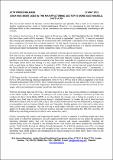May 2011 Basic Needs and Nutrition Basket: Creating more Jobs in the Manufacturing Sector is more Sustainable, Says JCTR

View/
Date
2011-05-17Author
Jesuit Centre for Theological Reflection
Type
StatementLanguage
enItem Usage Stats
41
views
views
8
downloads
downloads
Abstract
It has been well documented that the high and sustained economic growth and poverty reduction experience in
East Asia was as a result of investing in labour intensive sectors such as manufacturing. Other labour intensive
sectors include agriculture and tourism. Using the employment intensity evidence from Zambia’s investment
portfolio, in real terms, investments in manufacturing has created more jobs in comparison to the mining sector.
The simple reason here is that mining is a very capital intensive sector while manufacturing and other sectors
such as agriculture are labour intensive. According to JCTR, “if the aim is to increase and sustain formal jobs,
the focus should be on boosting the manufacturing sector rather than the mining sector”. Consequently, a
vibrant industrial strategy where value addition is the driving factor should create more formal employment
over a sustained period of time.
Description
JCTR hopes that the Government will keep to its plan of increasing formal employment from the estimated
8.5% to 20% and reducing informal employment from 64.7% to 50% by end of 2015 as stipulated in the Sixth
National Development Plan (SNDP). Since formal employment accounts for only about 10% of the country’s
workforce, the rest are in informal employment. Informal jobs are mostly precarious and characterized by low
wages, which are inadequate to sustain oneself and their family.